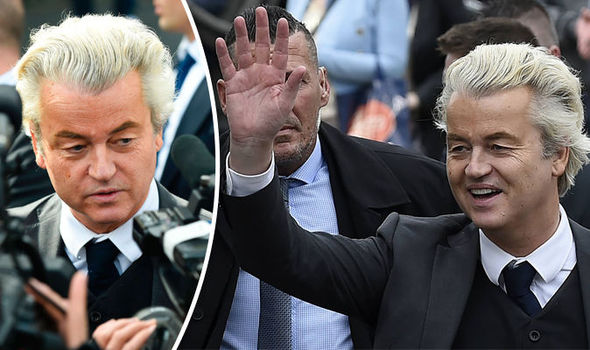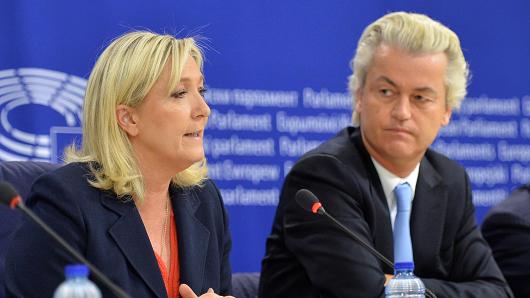The Fate of Populism in Europe: The Dutch Election and a Preview of France, Germany, and Italy

On Wednesday the Dutch voted in huge numbers (82% turnout) in the first of three crucial Eurozone elections this year. Rarely has a Dutch election drawn this much global interest and financial-market attention. Preliminary, unofficial results indicate that incumbent Prime Minister Rutte’s party won 33 seats in the 150-member legislature while Wilders’ party won 20 seats.
Rutte is now poised for a third term as prime minister. He seems to have profited from co-opting much of Wilder’s thunder in the hard line he drew in a diplomatic standoff with Turkey over the past week. The fight erupted over the Netherlands’ refusal to let two Turkish government ministers address rallies in Rotterdam about a referendum that could give Turkey’s President Erdogan more powers. It gave Rutte an opportunity to show his new-found nationalism by refusing to bow to foreign pressure, a stance with widespread backing in the nation.
Wilders, who campaigned on radical pledges to close borders to migrants from Muslim nations, close mosques, ban the Quran and take the Netherlands out of the EU, had insisted that whatever the result of the election, the kind of populist politics he and others in Europe represent aren’t going away. After the results were reported, Wilders commented,
We were the third biggest party, but now we are the second biggest party in the Dutch Parliament and a major political force. I promise you: Next time we will be first! The genie cannot be put back in the bottle.
I assure you: We will not stop trying to save our beautiful country, the Netherlands, our European civilization and our Western freedoms.
Still, it’s hard to be cheerful given that Wilders polled only around 13% of the vote — after all the horror stories related to African and Islamic migration to Europe that have appeared since the last election.
The Netherlands has so many political parties — a dozen hold seats in parliament — that no one party has ever won a majority on its own. In the coming months Dutch MPs will negotiate over potential ruling coalitions. While Wilders will command the second largest group of MPs in the house, he will likely be frozen out of negotiations by centrist parties desperate to keep him out of power.
Despite Rutte’s VVD remaining the largest party, the election brought a dramatic change in fortune for the traditional parties, a five-point drop for the conservatives and a Labour party crash from 26 to 6 points. These collapses in the mainstream parties have been a boon to smaller, newer parties which have been boosted in their stead. Wilders’s PVV picked up five more seats — a 33% increase, and the Green-Left party are set to pick up ten extra seats out of the wreckage of the Labour party. Other notable achievers including the Denk (‘Think’ Party), founded by Turkish-origin former Labour politicians who launched the movement as Europe’s first by-migrants-for-migrants party. They are set to have three members of parliament.
The Dutch election illustrates two trends that reflect the wider political landscape across Europe, both stemming directly from challenges on the right. First, in order to survive elections, mainstream parties have shifted their rhetoric to the right, placating electors who strongly oppose further Islamization of their homeland. Second, opposing the surging populists has splintered the mainstream center-right and center-left parties into more and smaller parties creating inherently unstable coalitions. We have just seen both effects in the Netherlands.
The highly divisive Dutch election campaign, in which virtually all parties defined themselves vis-à-vis Geert Wilders, has only widened the gap between the future coalition parties. Both the Christian Democrats and Prime Minister Rutte’s V.V.D. have moved noticably to the right, adopting softer, more superficial, and hopelessly ineffective versions of Wilders’ positions in order to undermine his rising popularity. For example, Rutte has authorized banning the Islamic full veil in public places and in an open letter, published online and in full-page newspaper advertisements, he warned of “something wrong with our country” and said “the silent majority” would no longer tolerate immigrants who come and “abuse our freedom.”
The new government will be simply an anti-Wilders coalition consisting of a half-dozen smaller parties that span almost the entire political spectrum and have nothing in common except their opposition to Wilders.
While previous Parliaments have counted 14 or more factions, what has changed is the relative size of the parties. In 1986, the top three parties together won 85% of the vote. In 2003, it was down to 74%. Today it is just around 45%.
In other EU countries there will be similar pressures to pursue anti-migrant populist policies if only to keep the far-right out of power. France, Germany (and possibly Italy) also have elections this year in which populist candidates and parties are hoping to make an impact.
French Election Preview: April 23, May 7

Marine Le Pen and Geert Wilders
Although there are 11 nominees for the next French President, The Institution of French Public Opinion most recently predicted that just three are in the running. FN’s Marine Le Pen has received about 25% of the polls steadily for over a year. She is trying to appeal now to supporters of conservative François Fillon who are disillusioned by a financial scandal, while centrist Emmanuel Macron too is rising in the polls.
The candidates are pitted against each other twice — the first round of the vote takes place on April 23. Then, the two top candidates face each other in a second run-off, on May 7. As always, the key question is which of the three will be eliminated in the first round. The second round prompts many voters to select a new candidate based on who a previous candidate endorses. This system makes it more difficult to predict the results of the second round until the first round is complete.
The most recent poll showed Le Pen would receive 26% of the popular vote, Macron 19.5% and Fillon 18.5%. The same poll reported that in a second round of elections Le Pen would lose to both Fillon and Macron, with a tighter margin against Fillon.
Similar to Trump and Wilders, Le Pen has placed an emphasis on putting France first and has spoken out against the Islamization of France. Echoing Wilders, Le Pen has claimed that “Islamism” is incompatible with the secular ideals of France.
Once the favorite, Fillon’s numbers have dropped because of his involvement in a financial scandal concerning allegations that he paid approximately 1 million euros, mostly funded through taxes, to his family as parliamentary aides. Previous IFOP polls in January predicted him receiving up to 26% of the votes and, as a candidate of the right, the scandal has pushed more support to Marine Le Pen, as reported by the Independent.
In contrast to the policies of Fillon and Le Pen, Macron represents liberal centrism. He founded his own party in April 2016 and has since established strong support in the polls. Mr. Macron advised president François Hollande’s on economic reform before serving as economy minister from 2014 to this year.
The pro-business ex-minister who has never held elected office, insists he is “neither of the Left or the Right” but “for France.” As a relative newcomer to the rough and tumble of a French election campaign, his lack of experience will prove to be his main source of appeal, or his downfall, depending on who you ask.
Germany: Sept. 24
Merkel, chancellor of Europe’s biggest economy for more than 11 years, wants to win a fourth term in the Sept. 24 election but she faces a strong challenge from the SPD’s new leader Martin Schulz, a former president of the European Parliament.
Germany’s center left Social Democrats (SPD) were up 1%age point at 33%, level with Chancellor Angela Merkel’s conservatives who were unchanged, an Emnid poll showed. Chosen at the end of January by his party to run against Merkel, the outspoken EU critic Schultz has reinvigorated the SPD and pushed them up by around 10%age points in the polls. Campaigning on issues including social justice and proposing tweaks to major labor market reforms, he wants to form a leftist alliance with the Greens, on 7% in the Emnid poll, and possibly with the radical Left, on 8%.
The right-wing Alternative for Germany (AfD) was down 2 points at 8%, their worst showing in an Emnid poll since January 2016 though still on track to enter the Bundestag lower house of parliament. They gained popularity last year by criticizing Merkel’s open-door refugee policy but have slipped in recent weeks.
The Emnid poll of 1,882 voters was conducted from March 2 to March 8 for Bild am Sonntag weekly.
“There is something of a weariness when it comes to Merkel,” Carsten Brzeski, chief economist at ING-Diba bank, told Bloomberg news agency. “I don’t think there would be that much of a difference (between Merkel and Schulz) to be honest in terms of policy,” Pepijn Bergsen, analyst at the Economist Intelligence Unit, told CNBC on Monday. “Martin Schulz is Angela Merkel with a beard,” Hermann Binkert, head of the Insa polling institute, told Bild.
“Germany seems to be a bit behind to a lot of other European nations in that move towards that populist vote,” Bergsen told CNBC while noting that the AfD is almost certain to get into parliament after the election vote.
Italy
Italy is not due to have elections until next year but the current disarray is making earlier elections more likely than ever, perhaps as soon as June. The spectacular failure of Matteo Renzi has reduced Italy’s fractious politics to a shambles more complete even than all the previous political shambles in a turmoil-ridden country. Renzi has demolished whatever structure or continuity remained in Italy’s center-left just as effectively as Silvio Berlusconi dismantled the center-right.
This leaves Beppe Grillo as the last man standing. For all the scandals and infighting that beset his 5 star movement, it continues to rise in opinion polls, as strong anti-establishment feeling enables Grillo to levitate in much the same way Donald Trump does, despite the barrage of criticism heaped upon him by the elites and the mainstream media.
Since the Democratic and Progressive Movement splintered off last month, it has drained support from the Democratic Party in opinion polling and allowed the Grillo’s M5S to take the lead. Grillo’s movement has resolutely refused to consider a coalition government, but its 30% would not be enough to win a majority in Parliament.
On the right — which is where most analysts would place 5SM — there are the separatist Northern League led by Matteo Salvini and the Forza Italia led by Berlusconi, the longtime prime minister who is diminished but hardly a spent force. If these three parties could find their way together to govern, they would easily have a majority, according to current polls.
The globalist, multicultural EU policies foisted upon Europe by an out-of-touch political elite has made voters across the continent restive. Speaking to French magazine Journal du Dimanche last month Mr Grillo described the European Union as “a total failure” that needed to be re-imagined. “I am in favour of a different Europe, where each state can adopt its fiscal and monetary system. I no longer feel the spirit of Europe.”





Comments are closed.